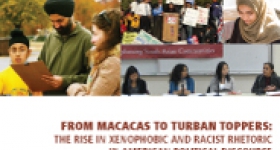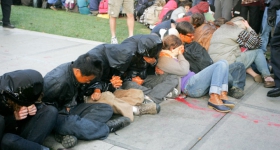Yes, Oakland now has a Koreatown, or more precisely, a "Koreatown/Northgate Community Benefit District," which means the businesses along Telegraph between 20th and 35th pay higher taxes and get more policing and cleaning.
I saw the streetlamp banners go up a few weeks ago, and heard my local cafe owner complain good-naturedly about the absurdity of it. Only 7 percent of the property in the area is owned by Koreans, and the majority of them are owners only, not residents.
There's a lot of potential for conflict here, as in L.A., where nonresident landlords call the shots with resident, often black, business owners. And there is already some conflict, not surprisingly primarily with black business owners, including one who claims that his Korean landlord threatens him and is trying to drive him out of business.
But, according to the linked East Bay Express article, the board of the Benefit District nonprofit has hired a local Af Am resident to be the community ambassador (and he sounds pretty awesome.) And the spearhead of this whole endeavor, Alex Hahn, seems to get it, too:
Such sentiments are nothing new to Alex Hahn, who operated
businesses in majority African-American neighborhoods for years. "We
have to understand: if you non-black community, you get in there, they
think you invade their territory," he said, adding that the situation
is the same no matter what race the majority community is.That's why he says it's important that the Korean businesses include
everyone, and be sensitive to their concerns. "I think we owe them
because we make money from their community," he added. "We have to give
them opportunity." When he operated Acorn Market in West Oakland, Hahn
said the majority of workers he hired were from the neighborhood. When
young people came and vandalized his store during the Rodney King
riots, he chose not to call the police because he said it would have
made the situation worse.
This broad perspective is important because of the (sometimes justified) perception that Koreans come into African American communities, make money off of them, only hire other Koreans, and then take the money back out of the community. It's a pretty ... well ... colonizing thing to do -- to come into a neighborhood you don't even live in, buy up the property, and then decide to call it after yourself. On the other hand, if you're the only community willing to take that kind of action, the only one that's participating in the meetings and doing the legwork, how should that work be acknowledged?
And if the name were to acknowledge the predominantly black community it's located in, how would you do that? What would you call it? There are only district names for African and Carribbean immigrant enclaves, not African American communities. How do you capture that in a name, especially since, although they are still far too often second class citizens, African Americans are still universally considered American, whereas immigrants ... not so much. It's only the foreign Other that requires naming in this manner.
And that may be one of the reasons that Oakland doesn't have an African American-town. It's not just that most major American cities have substantial African American populations. It's that Oakland is known as an overwhelmingly black city. Like Atlanta or Washington D.C., you just say the city name and everyone knows what group dominates there. In fact, Oakland is often used as a metonym for a predominantly black city.
And that in itself is misleading, since in Oakland is spoken over 150 languages (although interestingly enough, since about half of the Oakland Public School system's students are African American, in 1996 African American Vernacular English [AAVE], a.k.a. "Ebonics," was adopted as the school district's second official language, and bilingual classroom instruction using Ebonics was mandated.) Just spend an afternoon on a bench on Lake Merritt, the city's real commons, and you'll get a sense of the enormous diversity of Oakland. I'd love to see "Oakland" become a metonym for incredible diversity led by African Americans. Think that's too long a phrase for such a small word?









Comments